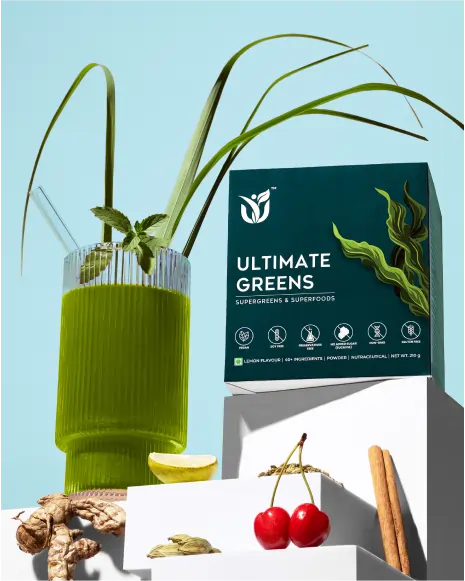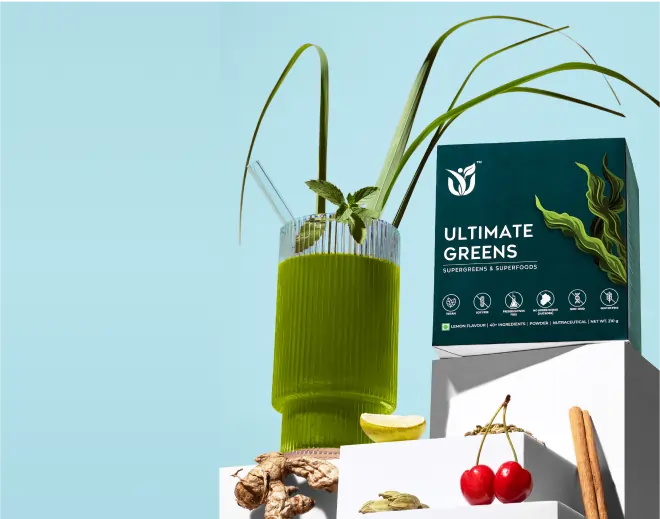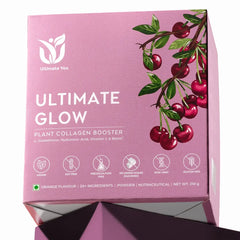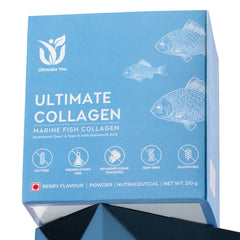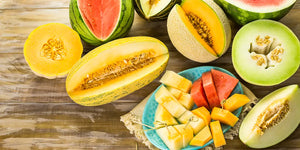From berries to green tea, antioxidants offer extra protection from UV rays while repairing skin, preventing sunspots, and maintaining a fresh, healthy appearance.
We all know that sunscreen is essential. But what if your skin had an extra layer of defense—something that works from the inside out? Start giving yourself antioxidants.
Antioxidants don’t just fight ageing or improve skin tone; they also play a prominent role in boosting your skin’s natural resistance to UV rays. While they can’t replace sunscreen, they can complement it beautifully, giving your skin an extra line of protection against sun damage, premature ageing, and even skin cancer.
Let’s dive deep into how antioxidants work, the best ones for sun protection, and how to include them in your skincare and diet for maximum benefit.
Why Does Your Skin Need Antioxidants?
Sunscreen blocks or absorbs harmful UV rays to prevent burns, tanning, and long-term damage. But even the best SPF can’t give you 100% protection. That’s where antioxidants come in.
Here’s what antioxidants do:
- Neutralize free radicals produced by UV radiation
- Reduce inflammation caused by sun exposure
- Minimize oxidative stress and DNA damage
- Repair and strengthen skin cells post-exposure
Using antioxidants daily both topically and through your diet can & improve your skin’s defense system.
How does the sun damage your skin?
When UV rays hit your skin, they cause a chain reaction:
1. Free Radical Formation: Unstable molecules start damaging cells.
2. Inflammation: This leads to redness, irritation, and a breakdown of collagen.
3. DNA Damage: In extreme cases, this may lead to mutations and skin cancer.
4. Photoaging: Fine lines, dark spots, and sagging skin set in faster.
Antioxidants help break this cycle by neutralizing free radicals before they cause damage. This protects against inflammation, ageing, and other oxidative stress effects, helping maintain overall skin health and integrity.
Top 10 Antioxidants That Help Protect Skin from UV Damage
1. Vitamin C (Ascorbic Acid)
Vitamin C is one of the most powerful antioxidants. It scavenges free radicals, supports collagen production, and reduces pigmentation caused by UV exposure. This action helps prevent oxidative damage to skin cells. Additionally, vitamin C is essential for collagen synthesis, a protein that maintains skin structure and elasticity.
By supporting collagen production, it helps reduce the appearance of fine lines and wrinkles. It also inhibits the enzyme tyrosinase, which is involved in melanin production, thereby helping to fade hyperpigmentation and even out skin tone.
How to use it?
Use a 10–20% Vitamin C serum in the morning under sunscreen. Also eat citrus fruits, bell peppers, strawberries, and broccoli.
2. Vitamin E (Tocopherol)
Vitamin E is a fat-soluble antioxidant that integrates into cell membranes, where it neutralizes lipid peroxyl radicals. By doing so, it helps maintain the integrity and function of cells, especially in the skin. It also works synergistically with vitamin C: when vitamin E neutralizes a free radical, it becomes a weak radical itself. Vitamin C helps regenerate vitamin E back to its active form, enhancing its antioxidant capacity.
How to use it?
Look for moisturizers or sunscreens with tocopherol. Include almonds, sunflower seeds, and spinach in your diet.
3. Astaxanthin
Astaxanthin, a reddish pigment from microalgae, is 6000 times more potent than Vitamin C in neutralizing free radicals. Its unique structure allows it to span cell membranes, offering superior protection against oxidative stress.
Many clinical studies show reduced wrinkles and improved skin elasticity after 6-8 weeks of use.
How to use it?
Astaxanthin is available as an oral supplement and is naturally found in wild salmon, krill, and shrimp, offering powerful antioxidant protection from within..
4. Lycopene
Lycopene, a powerful antioxidant found in tomatoes, helps protect the skin by absorbing UV radiation and neutralizing free radicals. This action reduces stress, which lowers inflammation and the skin’s sunburn response. Regular intake has been linked to less redness and improved skin resilience to sun exposure.
Additionally, you can also make use of glutathione-rich foods to support natural skin brightening.
How to use it?
Include cooked tomatoes, watermelon, red carrots, and guava in your diet regularly to boost lycopene intake, enhancing your skin’s natural defense against sun damage.
5. Polyphenols (Green Tea, Grapes)
Polyphenols are natural compounds in plants that exhibit strong antioxidant and anti-inflammatory properties. They neutralize free radicals generated by UV exposure, preventing oxidative damage to skin cells. Additionally, polyphenols modulate cellular signaling pathways, reducing inflammation and enhancing the skin’s resilience against photoaging and environmental stressors.
How to use it?
Apply green tea extracts or grape seed serums. Drink green tea or grape juice daily.
EGCG, the key polyphenol in green tea, offers strong photoprotection by reducing UV-induced inflammation, preventing DNA damage, and supporting skin repair and antioxidant defense.
6. Niacinamide (Vitamin B3)
Niacinamide, a form of vitamin B3, reduces UV-induced inflammation by inhibiting inflammatory pathways and protecting skin cells. It enhances skin barrier function by promoting ceramide production, which improves moisture retention. Additionally, niacinamide helps even out skin tone by reducing hyperpigmentation and boosting overall hydration.
How to use it?
Apply a 5% niacinamide serum morning and night. Include eggs, nuts, and mushrooms in your meals. It is suitable for all skin types, including sensitive or acne-prone skin.
7. Coenzyme Q10 (CoQ10)
Coenzyme Q10 (CoQ10) is vital for energy production in skin cells, supporting cellular repair and regeneration. As we age, CoQ10 levels decrease, impairing skin’s ability to combat oxidative stress.
How to use it?
Apply creams with ubiquinone or take oral supplements. Include oily fish, meat, and spinach in your diet.
8. Resveratrol
Resveratrol, found in red grapes and berries, helps promote healthy circulation, which aids in delivering nutrients and oxygen to skin cells. It also supports the skin's natural detoxification processes, thereby reducing the accumulation of harmful toxins. Additionally, resveratrol has anti-inflammatory properties that help prevent long-term skin damage.
How to use it?
Look for serums with resveratrol (especially for nighttime). Eat blueberries, dark chocolate, and red wine (in moderation).
9. Beta-Carotene (Provitamin A)
Beta-carotene, an antioxidant rich food, helps enhance the skin’s resilience to UV radiation by stimulating the production of protective molecules like melanin. It also strengthens the skin's protective barrier, making it less susceptible to dehydration and environmental stressors. With consistent use, it can gradually reduce UV sensitivity.
How to use it?
Eat orange and yellow vegetables like carrots, sweet potatoes, and pumpkin seeds. You can also take health supplements as guided by the doctor.
10. Selenium
Selenium plays a crucial role in modulating the body's inflammatory response, reducing the risk of chronic skin conditions triggered by UV exposure. It also helps regulate thyroid function, which can indirectly improve skin texture and radiance, supporting overall skin health and vitality.
Apart from these, you can also explore natural skincare tips and remedies that support the skin’s barrier, boost hydration, and promote long-term radiance without relying on harsh chemicals.
How to use it?
Eat Brazil nuts (1–2 per day is enough), fish, and eggs. Selenium is also available in multivitamins.
Skincare Routine for Daily Sun Defense
Morning
1. Cleanser: Use a gentle cleanser to remove impurities and prepare the skin.
2. Vitamin C serum: Apply Vitamin C serum to brighten skin and protect against UV damage.
3. Niacinamide or Green Tea extract: Use niacinamide to reduce inflammation or green tea extract for antioxidant protection.
4. Moisturizer: Hydrate and maintain skin balance with a lightweight moisturizer.
5. Sunscreen (SPF 30+): Finish with broad-spectrum sunscreen to protect against UV rays.
Night
1. Resveratrol or CoQ10 serum: Apply resveratrol to reduce oxidative stress or CoQ10 to support skin repair.
2. Hydrating cream or mask: Use a hydrating cream or mask to replenish moisture overnight.
Bonus Tip: Use antioxidant-rich face masks (like turmeric, honey, green tea) 1–2 times a week.
Foods That Boost Skin’s Natural UV Protection
Add skin-friendly foods like hydrating fruits, antioxidants, and healthy fats to your diet to promote a glowing complexion, protect against UV damage, and maintain skin health. Read on to know more!
- Tomatoes – Lycopene
- Carrots – Beta-carotene
- Berries – Polyphenols and Vitamin C
- Almonds & Sunflower seeds – Vitamin E
- Salmon & Shrimp – Astaxanthin
- Brazil Nuts – Selenium
- Green Tea – EGCG
- Spinach & Kale – Lutein and Zeaxanthin
A colorful plate ensures a variety of antioxidants from different fruits and vegetables, each offering unique benefits like protecting against UV damage, reducing inflammation, and promoting skin health. For more information about foods to protect skin from UV rays.
Antioxidant Supplements: Are They Necessary?
While getting antioxidants from whole foods is ideal, supplements can be beneficial in certain situations. If you have dietary restrictions, travel often, or need specific support like astaxanthin for sunburn-prone skin, supplements can help ensure consistent protection.
Popular antioxidant supplements for skin health include:
- Astaxanthin (4–12 mg/day)
- Vitamin C (500–1000 mg/day)
- CoQ10 (100–200 mg/day)
- Lycopene (10–30 mg/day)
- Green tea extract (250–500 mg/day)
Always consult a healthcare provider before starting supplements, especially if you’re on medication.
Final Thoughts
Incorporating antioxidants into your routine is one of the smartest ways to protect your skin from the inside out. While they don’t eliminate the need for sunscreen, they can significantly reduce sun damage, inflammation, and early signs of aging.
Start small: Add a Vitamin C serum to your morning skincare and sip on green tea daily. Over time, build a holistic routine with antioxidant-rich foods, supplements (if needed), and targeted serums.
Because glowing, resilient skin isn’t just about what you put on—it’s also about what you put in.
Disclaimer
The information provided is for educational purposes only and is not intended to be a substitute for medical treatment. If you're pregnant, nursing, taking medication, or have a medical condition, it's better to consult a healthcare professional. Ultimate You does not provide any guarantee regarding the accuracy, adequacy, completeness, legality, reliability, or usefulness of the information and disclaims any liability arising from it.

Ram Charan
Content Lead
With over 7 years of experience, he crafts engaging stories and compelling narratives. He believes crisp and engaging content adds value to customers and drives immense sales to businesses. When he's not working, you'll find him hanging out with friends, binge-watching movies, and exploring the world of organic foods.
Frequently Asked Questions
Can antioxidants replace sunscreen?
Antioxidants support your skin’s defense by neutralizing free radicals caused by UV exposure, but they don’t block UV rays.
How long before antioxidants start working?
Antioxidants can soothe redness quickly, but visible improvements in sun defense and skin health usually take 4–8 weeks of consistent use to show.
Can you combine multiple antioxidants?
Yes! Many antioxidants work better together like Vitamin C, E, and Ferulic Acid—boosting each other’s stability and effectiveness for enhanced skin protection and repair.
Are antioxidant sunscreens effective?
Yes. Look for sunscreens that include ingredients like Vitamin E, green tea, or niacinamide for added protection.
- Choosing a selection results in a full page refresh.
- Opens in a new window.
15%

on your next order
By submitting your email address, you agree to receive marketing emails from Ultimate You at the email address provided. We may use information collected about you on our site to suggest the products and offers. you can withdraw your consent at any time by following the unsubscribe instructions in any email we send to you. view Terms and Privacy. Contact Ultimate Customer Care at #204-8430 Saint Monica Building, near Char Miner, Hyderabad, India, 203455.
